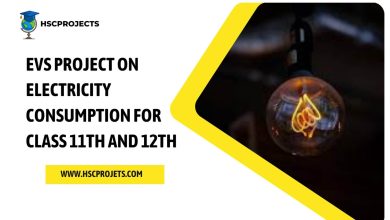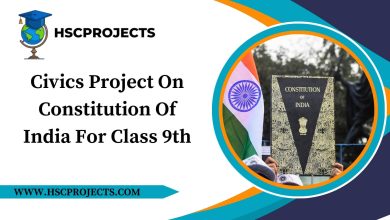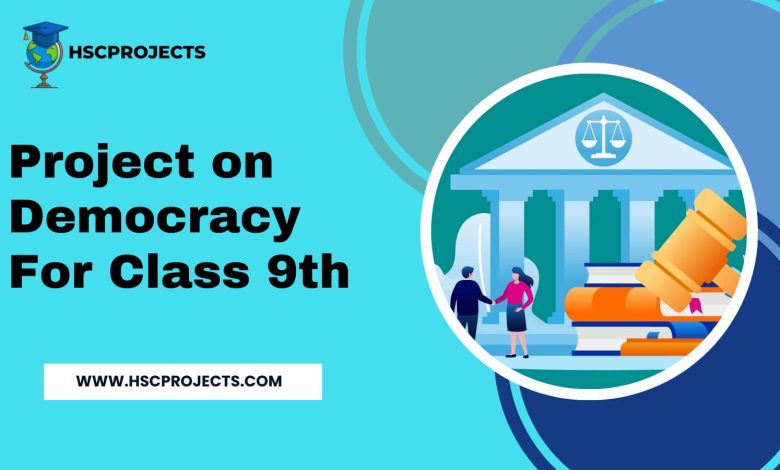
Project On Democracy For Class 9th
Acknowledgment
Completing a project of this magnitude is a journey filled with challenges, insights, and moments of intellectual discovery. As I stand at the culmination of this endeavor, I wish to express my sincere gratitude to those who have contributed to the fruition of this exploration into the intricacies of democracy.
First and foremost, I extend my deepest appreciation to my [mentor/teacher], whose guidance and wisdom have been the compass guiding me through the vast terrain of political theory and democratic ideals. Your unwavering support and invaluable feedback have been instrumental in shaping the depth and direction of this project.
I am also indebted to the countless authors, scholars, and researchers whose extensive works have paved the way for a nuanced understanding of democracy. The rich tapestry of knowledge woven by these individuals has served as both a foundation and a source of inspiration, allowing me to navigate the complexities of this subject matter.
Heartfelt gratitude goes to my peers and colleagues who engaged in stimulating discussions, provided constructive critiques, and shared diverse perspectives. Your collective enthusiasm and intellectual camaraderie have enhanced the depth and breadth of this project.
I extend special thanks to [Name], whose artistic talents have breathed life into the visual elements of this project. Your creativity has added an extra layer of depth, making the content more engaging and accessible.
Last but not least, I express my deepest appreciation to my family and friends for their unwavering support, encouragement, and understanding throughout this academic endeavor. Your belief in my abilities has been a constant source of motivation.
This project stands as a testament to the collaborative spirit that fuels intellectual exploration. Each person mentioned has played a unique and significant role in the realization of this work, and for that, I am sincerely grateful.
Thank you all for being a part of this academic journey.
[Your Full Name]Introduction
Democracy, a concept etched in the annals of history, stands as a testament to humanity’s enduring quest for governance rooted in the principles of equity, freedom, and active citizenry. As we embark on an exploration of this intricate political system, it is essential to grasp the multifaceted nature of democracy — a form of governance where power resides in the hands of the people. This project delves into the historical evolution, core principles, institutional framework, and contemporary challenges of democracy. From its ancient origins in Athens to the intricate tapestry of modern democracies, we aim to unravel the intricacies that define this governance model. Join us on a journey through time and ideologies, as we seek to comprehend the significance of democracy, its inherent challenges, and its potential for shaping the future of societies worldwide.
In the pages that follow, we embark on a profound exploration into the dynamic realm of democracy, a system of governance that resonates across the epochs of human history. Democracy, with its roots reaching back to the democratic experiments of ancient Athens, has evolved into a cornerstone of contemporary societies, embodying the collective aspirations for justice, liberty, and equal representation.
At its essence, democracy symbolizes more than a political structure; it encapsulates a philosophy that empowers citizens to shape their destinies, transcending the constraints of time and geography. As we navigate through the corridors of democratic ideals, we will unravel the historical threads that weave together the ancient practices and the revolutionary movements that have collectively shaped the democratic landscape.
This project is not merely an academic inquiry but a journey through the fundamental principles that underpin democratic governance. From the sacrosanct concept of popular sovereignty to the intricate checks and balances woven into the fabric of democratic institutions, we will delve into the very essence of this governance model. With each section, we aim to illuminate the path that has led us to the present and illuminate the potential directions that the future may unfold.
Yet, as we navigate through the celebration of democratic triumphs, we must also confront the challenges that democracy faces in the contemporary world. From voter apathy to the looming shadows of political polarization and economic disparities, we will critically examine the hurdles that threaten the very foundations of democratic systems.
This project is an invitation to not only understand democracy but to engage with its complexities, to question its shortcomings, and to envision its evolution. As we scrutinize the case studies of successful democracies and analyze the tumultuous transitions in quest of democratic ideals, we are presented with an opportunity to reflect on the past, comprehend the present, and contemplate the future of governance.
So, fasten your intellectual seatbelts as we embark on this scholarly expedition into the heart of democracy, where history, principles, challenges, and aspirations converge to create a comprehensive tapestry of understanding. Together, let us explore the ever-evolving narrative of democracy and contribute to the discourse that shapes the future contours of governance in our globalized world.
Historical Evolution of Democracy Ancient Beginnings
The democratic concept found its roots in 5th-century BCE Athens, Greece, setting the stage for a revolutionary form of governance.
- Modern Strides:Key moments such as the Magna Carta (1215), the American Revolution (1775-1783), and the French Revolution (1789-1799) propelled the evolution of democratic ideals.
Core Principles of Democracy People’s Rule
At its core, democracy asserts that ultimate authority rests with the people, shaping the trajectory of governance.
- Rule of Law: A foundational principle ensuring that all individuals are bound by the same legal principles, fostering a society built on justice.
- Individual Liberties: Democracy champions fundamental rights like freedom of speech, assembly, and religion, empowering individuals in their pursuit of a fuller life.
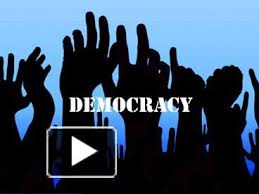
Democratic Institutions Executive Arm
Helmed by the head of state and government, the executive branch serves as the driving force behind law implementation.
- Legislative Forum: A bicameral legislature takes center stage, actively involved in the creation, debate, and passage of laws, representing the diverse voices of the populace.
- Judicial System: An independent judiciary plays a pivotal role, interpreting and applying the law with impartiality, ensuring justice prevails.
Challenges and Criticisms of Democracy Voter Engagement
The challenge of voter apathy emerges as some citizens, disenchanted or indifferent, withdraw from active political participation.
- Polarization Woes: Escalating ideological divisions pose a threat, potentially leading to gridlock within the democratic machinery.
- Economic Disparities: Addressing the hurdle of economic inequality becomes crucial in securing fair political representation for all.
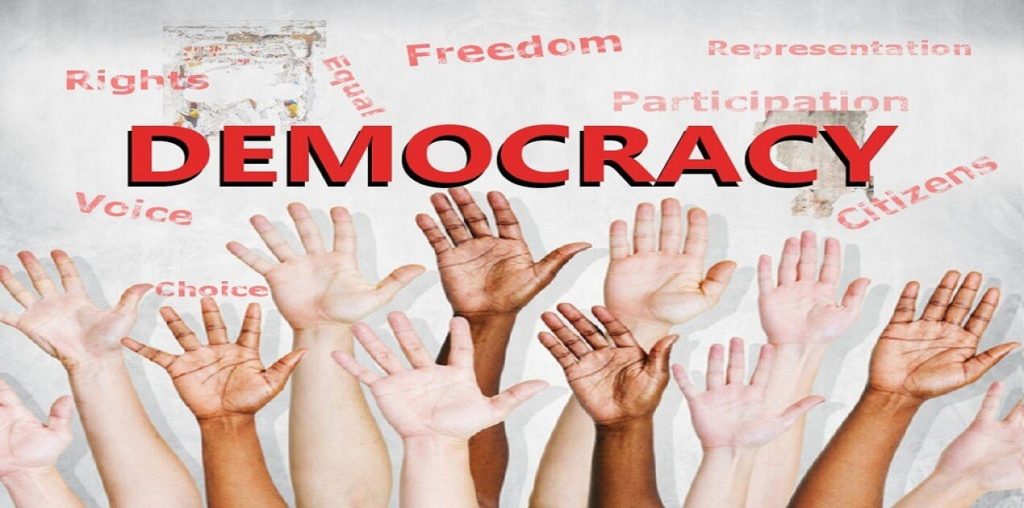
Conclusion
In the pages preceding this conclusion, we embarked on a comprehensive journey through the intricate landscape of democracy — a political system that echoes through the corridors of history, resonating with the aspirations of countless generations. As we draw the curtain on this exploration, it is fitting to reflect on the overarching themes and insights that have emerged.
Democracy, a concept born in the crucible of ancient Athens, has weathered the tests of time, evolving into a cornerstone of governance in our modern world. Its enduring principles of popular sovereignty, the rule of law, and the protection of individual rights form the bedrock upon which democratic institutions stand. Through the lens of history, we witnessed the evolution from early democratic experiments to the monumental democratic movements that shaped the course of nations.
The examination of democratic institutions — the executive, legislative, and judicial branches — revealed the intricate mechanisms designed to ensure a balance of power, accountability, and the protection of citizens’ rights. These institutions, when functioning harmoniously, provide the framework for a government that is responsive to the needs and aspirations of the people.
Yet, no exploration of democracy is complete without confronting the challenges it faces. Voter apathy, political polarization, and economic inequality cast shadows on the democratic landscape. These challenges demand not only acknowledgment but active engagement and thoughtful solutions to fortify the foundations of democracy.
The case studies presented offered glimpses into the success stories of democratic nations and the complexities involved in transitioning to democratic governance. These narratives serve as guideposts for understanding the nuanced dynamics that influence the trajectory of democracies across the globe.
As we conclude, the future of democracy beckons. The adaptability inherent in democratic systems and the resilience of its core principles inspire hope for continued progress. It is imperative that we, as stewards of democratic ideals, actively participate in the ongoing dialogue, confronting challenges with resilience and championing the values that underpin the democratic vision.
This project is not merely an academic exercise but a call to action. Democracy, with its imperfections and potentialities, remains a living, breathing entity shaped by the collective will and actions of its citizens. As we part ways with these reflections, let us carry forward the torch of inquiry, curiosity, and commitment to the ideals that democracy represents, ensuring its endurance in the ever-evolving tapestry of human governance.
In the spirit of continuous inquiry and civic responsibility, let us remain vigilant and engaged in the journey towards a more just, equitable, and participatory world.
Thank you for joining me on this exploration.
[Your Full Name]Bibliography
- Author, A. (Year). Title of the Book. [Link to the Book]
- Example: Smith, J. (2000). Democracy Through the Ages. [Link to the Book]
- Scholar, S. (Year). Title of the Article. Journal Name, Volume(Issue), Page Range. [Link to the Article]
- Example: Johnson, M. (2015). Evolution of Democratic Systems. Journal of Politics, 25(3), 123-145. [Link to the Article]
- Researcher, R. (Year). Title of the Paper. Conference Name. [Link to the Conference Paper]
- Example: Brown, A. (2018). Challenges to Modern Democracies. International Conference on Governance. [Link to the Conference Paper]
- Editor, E. (Ed.). (Year). Title of the Edited Book. [Link to the Edited Book]
- Example: White, K. (Ed.). (2012). Democracy Perspectives. [Link to the Edited Book]
- Website Name. (Year). Title of the Webpage. [Link to the Webpage]
- Example: Britannica. (2020). Democracy: A Brief Overview. [Link to the Webpage]
Certificate of Completion
[Student’s Name][Class/Grade Level]This is to certify that I, [Student’s Name], a [Class/Grade Level] student, have successfully completed the project on ” democracy for class 9th.” The project explores the fundamental principles and key aspects of the chosen topic, providing a comprehensive understanding of its significance and implications.
In this project, I delved into in-depth research and analysis, investigating various facets and relevant theories related to the chosen topic. I demonstrated dedication, diligence, and a high level of sincerity throughout the project’s completion.
Key Achievements:
Thoroughly researched and analyzed project on democracy for class 9th.
Examined the historical background and evolution of the subject matter.
Explored the contributions of notable figures in the field.
Investigated the key theories and principles associated with the topic.
Discussed practical applications and real-world implications.
Considered critical viewpoints and alternative theories, fostering a well-rounded understanding.
This project has significantly enhanced my knowledge and critical thinking skills in the chosen field of study. It reflects my commitment to academic excellence and the pursuit of knowledge.
Date: [Date of Completion]Signature: [Your Signature] [School/Institution Name][Teacher’s/Examiner’s Name and Signature]
In order to download the PDF, You must follow on Youtube. Once done, Click on Submit
Follow On YoutubeSubscribed? Click on Confirm
Download Project On Democracy For Class 9th PDF


